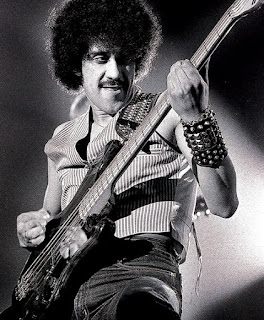Philip Parris Lynott (/ˈlɪnət/; 20 August 1949 – 4 January 1986) was an Irish musician and songwriter. His most commercially successful group was Thin Lizzy, of which he was a founding member, the principal songwriter, lead vocalist and bassist.
Growing up in Dublin in the 1960s, Lynott fronted several bands as a lead vocalist, including Skid Row alongside Gary Moore, before learning the bass guitar and forming Thin Lizzy in 1969. After initial success with "Whiskey in the Jar", the band found strong commercial success in the mid-1970s with hits such as "The Boys Are Back in Town", "Jailbreak" and "Waiting for an Alibi", and became a popular live attraction due to the combination of Lynott's vocal and songwriting skills and the use of dual lead guitars.
Towards the end of 1969, Lynott and Brian Downey were introduced to guitarist Eric Bell via founding member of Them, keyboardist Eric Wrixon (Bell had played in a later line-up of Them). Deciding that Bell was a better guitarist, and with Lynott now confident enough to play bass himself, the four formed Thin Lizzy. The name came from the character "Tin Lizzie" in the comic The Dandy. The "h" was deliberately added to mimic the way the word "thin" is pronounced in a Dublin accent. Lynott later discovered Henry Ford's slogan for the Model T, "Any colour you like as long as it's black", which he felt was appropriate for him. Wrixon was felt by the others to be superfluous to requirements and left after the release of the band's first single, "The Farmer" in July 1970.
During the band's early years, despite being the singer, bassist and chief songwriter, Lynott was still fairly reserved and introverted on stage, and would stand to one side while the spotlight concentrated on Bell, who was initially regarded as the group's leader. During the recording of the band's second album, Shades of a Blue Orphanage (1972), Lynott very nearly left Thin Lizzy to form a new band with Deep Purple's Ritchie Blackmore and Ian Paice, called Baby Face. "Ritchie turned up in the studio one day to jam," recalled Brian Downey. "I was asked to play drums to Phil and Ritchie jamming… Me and Eric looked at each other like, 'Well, that's the end of the band then.' It lasted a week, then Phil came back as if nothing had happened. He wanted to be the leader of his own band, not the singer in someone else's." Due to being in dire financial straits, Lizzy did, however, soon record an album of Deep Purple covers under the name Funky Junction. Lynott did not sing on the album as he felt his voice was not in the same style as Ian Gillan.
Thin Lizzy's first top ten hit was in 1973, with a rock version of the traditional Irish song "Whiskey in the Jar", featuring a cover by Irish artist and friend Jim Fitzpatrick. However, follow up singles failed to chart, and after the departure of Eric Bell, quickly followed by Moore replacing him, and briefly Downey, led Thin Lizzy to near collapse in mid 1974. It was not until the recruitment of guitarists Scott Gorham and Brian Robertson, and the release of Jailbreak in 1976, that Thin Lizzy became international superstars on the strength of the album's biggest hit, "The Boys Are Back in Town". The song reached the top 10 in the UK, No. 1 in Ireland and was a hit in the US and Canada. However, while touring with Rainbow, Lynott contracted hepatitis and the band had to cancel touring.
During 1983–85, Lynott co-wrote songs with British R&B artist Junior Giscombe, although nothing was officially released and most remain as demos. However, one song, "The Lady Loves to Dance", was mastered with producer Tony Visconti and nearly released before being pulled by the record company, Phonogram. Lynott was particularly upset about not being asked to participate in Live Aid, which had been organised by his two friends, Geldof and Ure, the latter of whom had briefly stood in as a guitarist for Thin Lizzy. Geldof later said this was because the Band Aid Trust could only accommodate time for commercially successful artists selling millions of albums, which neither Lynott nor Thin Lizzy had done.
His last single, "Nineteen", released a few weeks before his death, was produced by Paul Hardcastle. It bore no relation to the producer's chart-topping single of the same title some months earlier. "This was a guy whose records I used to play when I was at school," said Hardcastle. "He was a hero of mine – I couldn't work out why he wanted to work with me. He said to me, 'You're at the top of your game technically right now, so can you help me?'" The producer played the bassline on Lynott's Fender. "He walked in on me playing it and I thought, 'Shit!' said Hardcastle. "But he said, 'That's fokken great – we're keeping that on there
Lynott's last years were dogged by drug and alcohol dependency leading to his collapse on 25 December 1985, at his home in Kew.
He died of pneumonia and heart failure due to septicaemia in the hospital's intensive care unit on 4 January 1986, at the age of 36

Comments
Post a Comment